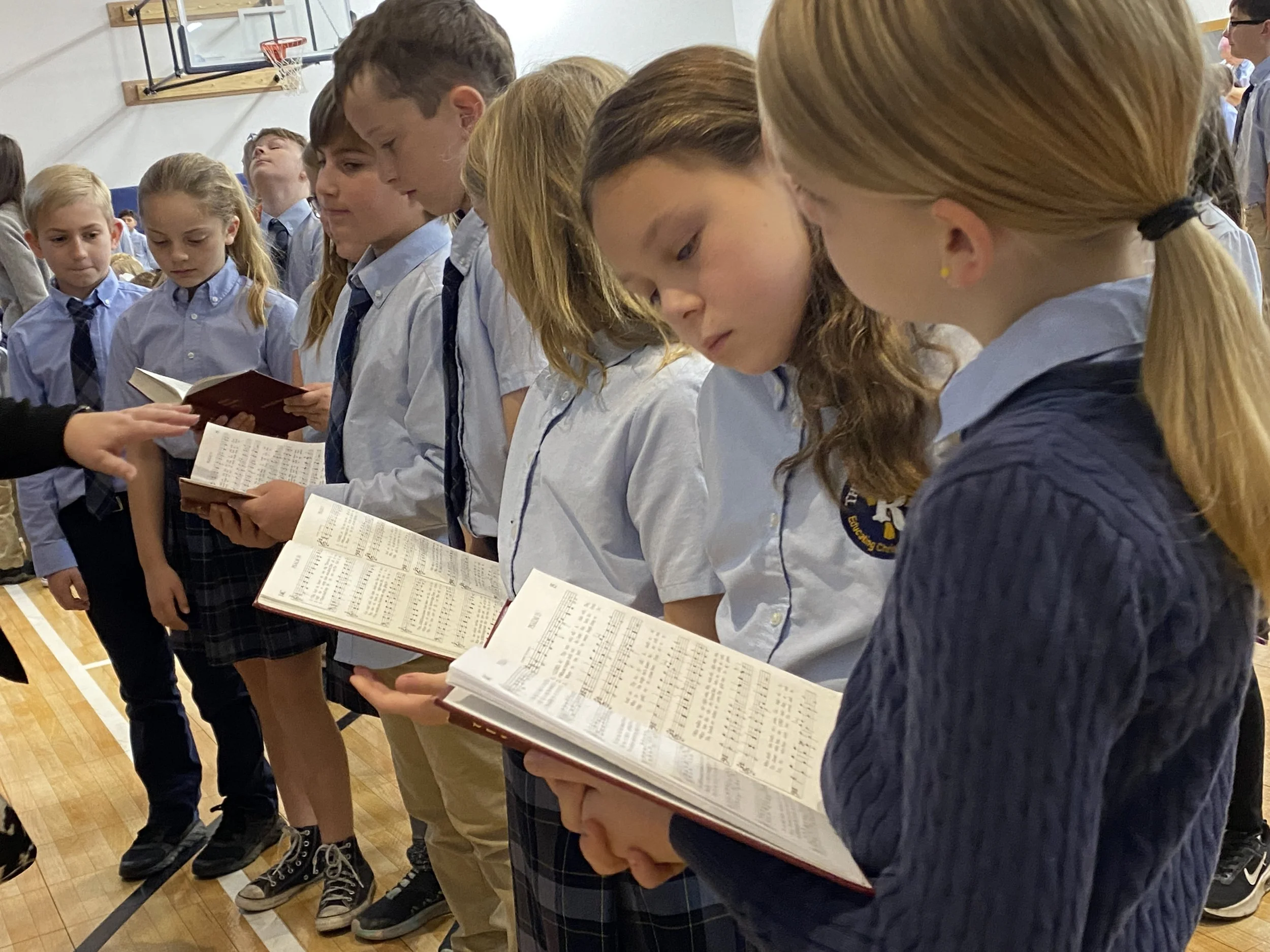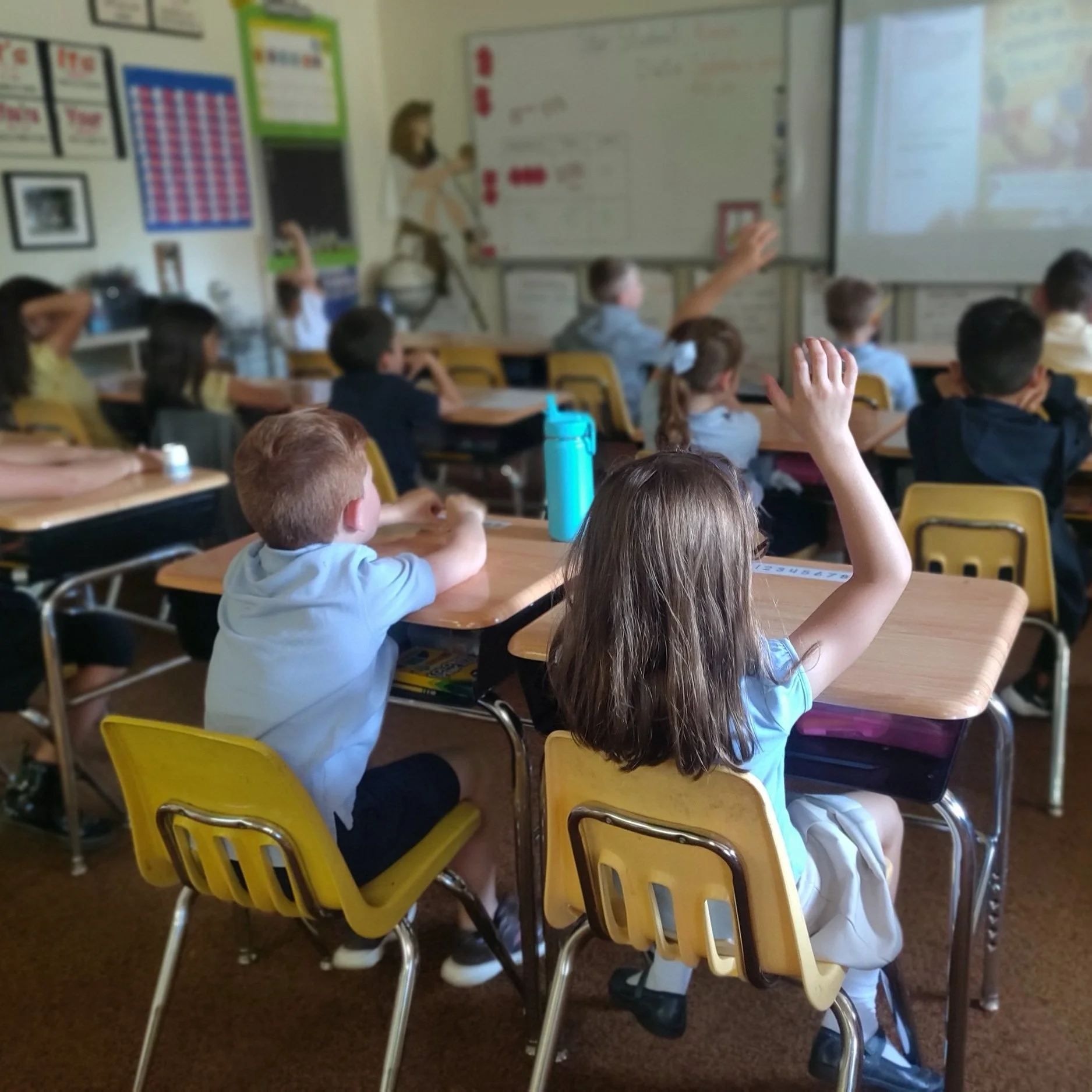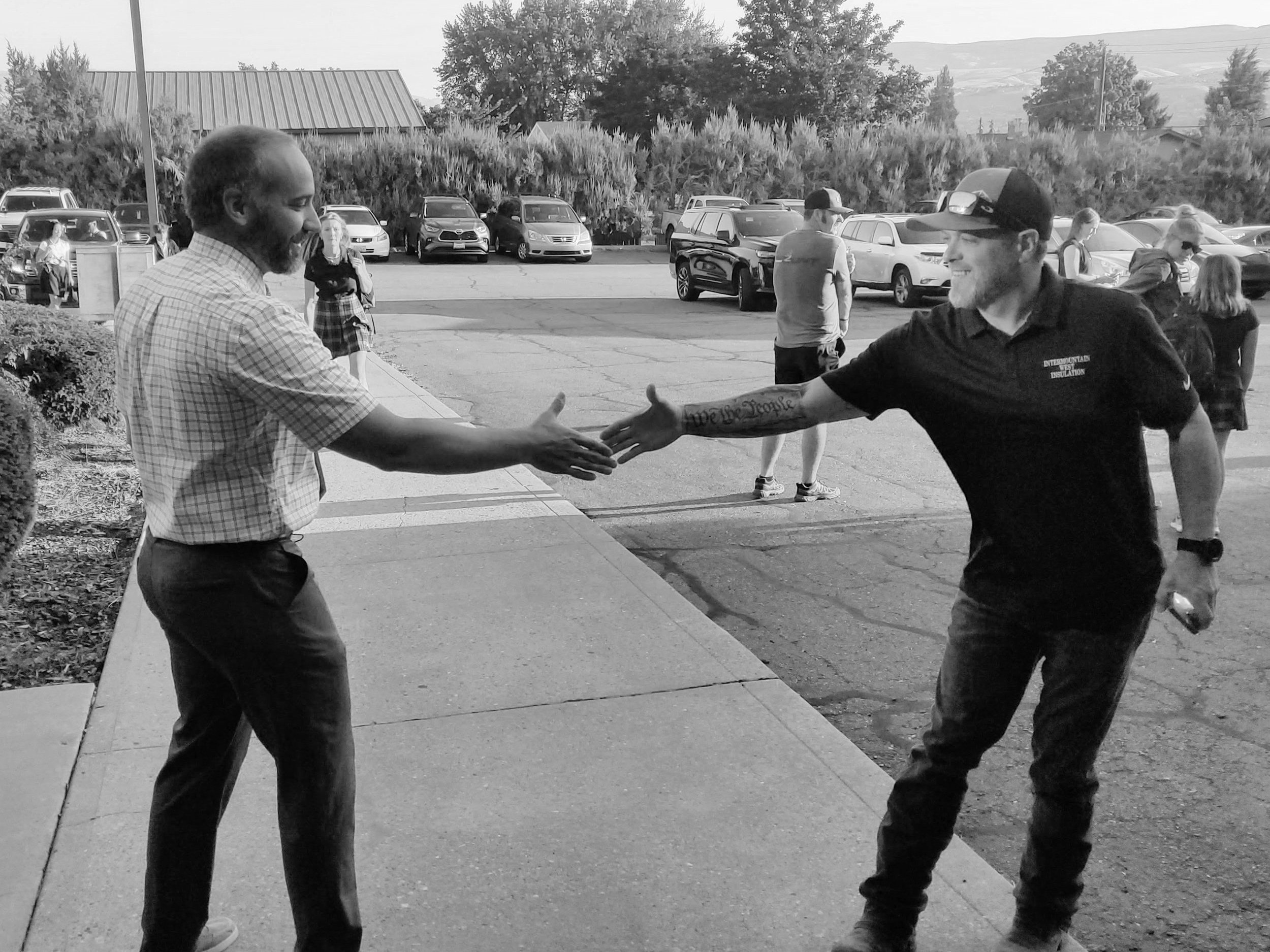As we reflect upon the vibrant tapestry of the 2024-2025 school year at TRA, it is clear that while our days were wonderfully full, our Great God has, with boundless generosity, provided for our every need and then some!
Paideia: The Heart of Classical Christian Education at TRA
At its heart, paideia is the formation of the whole person. Plato, in The Republic, likens education to turning the soul toward the light, orienting it to what is true and just. Aristotle complements this in Nicomachean Ethics, where he emphasizes the role of education in habituating virtue—shaping not only what a student knows, but how they live. These classical insights reach their pinnacle in the biblical vision of paideia, and Paul exhorts Christians to raise children “in the discipline and instruction of the Lord” (ESV, Ephesians 6.4). It is this vision that guides our school’s curriculum and culture, grounded in the conviction that all education is ultimately formation.
The Roar of the Lion Cub: Why Speech Meet Matters and Why We Introduce Public Speaking in 1st Grade
One unique aspect of our curriculum is the emphasis we place on public speaking, starting as early as 1st grade. Public speaking in our curriculum is not merely about eloquence; it is about equipping our students to proclaim the Gospel and speak truth in love. As Saint Augustine once said, "The truth is like a lion; you don’t have to defend it. Let it loose; it will defend itself." By teaching our students to communicate effectively, we are empowering them to be courageous witnesses of their faith, standing firm in their convictions and defending their ideas with grace and humility. By starting in 1st grade, our lion cubs can begin to find their roars.
Tuition Assistance: Easier and More Common Than You Think
Science Education through a Christian Worldview
I love my job. What a blessing to work with this amazing staff to try—in whatever way possible—to inspire awe in our students for this complex world. Come on, that is a worthy, daily challenge. Oh, wait, I can also begin each science class with prayer to the designer of everything? Outstanding.
But, why science? There are a lot of topics being taught at The River Academy, so why tackle Physical Science, Biology, Physics and Chemistry? Easy. I am, and will always be, fascinated by the intricacies of living organisms, patterns within the laws of motion, our immense galaxy (let alone the universe), and the countless reactions of simple elements like carbon, nitrogen, and oxygen. Man will never have it all figured out, but it is sure fun to try.
Do I always succeed in prompting this same fascination in our students? Absolutely not, but maybe along the way our students also learn practical life skills like organization with lab journals and collaboration through problem solving, projects, and debates. How satisfying to see 9th grade teams vivaciously debate energy production. Why? Because they are willing to examine and communicate to each other about real world problems that they may have never given a single thought to before. That is good stuff.
Our textbook is a regular, secular text by choice because we want our students to banter evolution alongside creationism. Armed with a Christian worldview, our students should have already discussed ever changing theories on how the universe and life began with and without including God’s perfect design. People in this world will challenge them. Let’s be honest: their friends already are, so it is wise to figure out where these ideas are coming from for a ready response.
Science should be hands-on and teach us that we can make guesses and be wrong. We can use our logic to problem solve and make corrections as needed. Our students should find it challenging to remember the details in the DNA code. They need to be willing to make mistakes as they attempt to understand the protein pumps in plasma membranes of each and every cell of their bodies. May they also appreciate that plants are way cooler than us because they can make their own food through photosynthesis.
Do I hope that our students will leave TRA and become employed in a science field? Sure. But, it is more about instilling curiosity for the unknown and feeling humbled by the vastness of creation and the Creator. It is those light bulb moments when a student realizes that the moon changes its position constantly and is the reason our oceans have tides. It is fun to watch students help and challenge each other to solve puzzles as they ask “why?” and “how?”.
So, as a teacher, is it possible to explain the stunning, mathematical order within the countless elaborate systems of our bodies, on this Earth and beyond? It is sure worth a try.
Partnering with Parents: TRA is Not a Drop-off School.
2024 Secondary Chapel: Do you believe this? How then will you live?
At The River Academy, our Christian faith is not merely one of many cultural distinctives for our school profile, rather, it is the very heartbeat of who we are and all we do. This is why our students and staff take time to gather together once a week for chapel. For secondary students, this means a thirty-minute midweek meetup each Wednesday morning at 8am to seek the Lord together through singing and Scripture.
In the midst of the hustle and bustle of schoolwork and sports and social life, gathering for chapel once a week is an oasis for quieting our hearts and finding refreshment and re-anchoring in the One who gives us truth and life and purpose in all we do. At the River, we don't view chapel as a religious requirement but as a happy huddle in the name and love of Jesus.
In the beautiful gym where we meet, there hang four big, bold banners reminding us of the main distinctives of our school: Christian, Classical, Joyful, Relational. But the truth is that the following three virtues must flow from the first. A passion for sharp-minded lifelong learning, glad-hearted gusto for life, and strong bonds of committed camaraderie—one with another, ultimately flow from the Spirit of God, who made us for such good things, and flow through the saving grace we get in Christ. It is only as fully-alive Christians that we can fully enjoy education classically, joyfully, and relationally.
In distinction from our individual Bible classes, though, chapel time helps us draw near the Fountain of our faith all together, as a body of believers. After all, even in the rhythms of school life, our faith is not walked out in isolation, but together in community. So, each Wednesday morning it is a joy to stand side-by-side and sing together of our hope in Jesus, led by a student worship team. Then we sit together for a brief message from the Bible, given by a staff member, student, or guest speaker. Parents are always welcome and encouraged to attend this special time together.
Practically, it helps our secondary students to see and appreciate one another in this chapel context: all together, side-by-side, singing and praying—not sentence-writing and problem-solving—so that when we are doing those academic activities throughout our classroom hours, it's not just as fellow students but hopefully in the spirit of brothers and sisters in Christ. Gathering corporately to hear reminders from the Bible about things like grace-based forgiveness helps us then walk it out in mutual accountability in the hallways and on the playfield.
The truths we’re reminded of in chapel also come up regularly during our instructional time, either organically in discussion or through intentional integration by the teacher. The overall yearly chapel theme gives a unifying flavor and framework for our fellowship and focus as we follow Jesus through another school year together. The past two years our chapel themes have been “Abide in Christ” and “All Things New.” This year, we’re exploring the relationship between what we believe and how we behave through the theme: BELIEVE - with the L-I-V-E letters lit up to focus on this relationship between what we really believe and how we really live.
Would you join us in praying for our secondary chapel times this year? May they be saturated by the Spirit of God, marked by humble reverence, caring camaraderie and sincere celebration, and may we then walk out well the commands of our king, side by side and bell to bell.
think!Mathematics: Math is a Language
Rhetoric, the crown jewel of Classical Education, was praised in the fourteenth and fifteenth centuries, with no or little emphasis placed on mathematics. Yet with each passing century and decade, classical circles have begun to recognize and praise the true value of students' understanding regarding the depth and complexity of mathematics. Many math programs teach the procedures of mathematics, but very few, if any, have understood that mathematics is its own language, and therefore its basic concepts must be understood at the earliest levels—just as any other language program.
As TRA continues to grow and improve, the administration conducted an evaluation with the elementary teachers and, as a result, changed the elementary mathematics program this summer in grades K-5 (we will add Grade 6 for the 25/26 school year). When contacted, many Classical Christian schools throughout the nation consistently praised one mathematics program above any others.
This robust new program, think!Mathematics, will continue to allow TRA to meet the needs of all students while retaining a high level of academic rigor. It is a Singapore-based program that is similar to our former Math in Focus program, however, this program more intentionally immerses students in math study with the underlying philosophy that mathematics is a language that must be understood in its own right. The program is structured so that every student is met exactly where they are in their level of understanding while also challenging them to keep building their understanding of the language of mathematics.
Each day’s lesson is structured to take around 60 minutes and includes five key components: explore, structure, journal, reflect, and practice. It differs from Math in Focus by including an anchor task, journaling, one lesson a day, one lesson spiraling, variation from lesson to lesson (within a unit), and a deeper understanding rather than surface-level learning. It also includes an amazing digital teacher toolkit and provides them with more ongoing training and support. This program also helps keep parents more accurately informed of what their children are learning in class each day.
Teachers have received training on this new program and are excited about the opportunity to teach math in this way. Further opportunities for professional development will also be available throughout the upcoming school year. We will also have a Family Math Game Night on Wednesday, November 6th from 6pm-7pm to help parents better understand this new program (more info to follow).
Please see the diagram below that captures the overall philosophy of the program. Thank you for continuing to partner with us as we seek curriculum solutions that align more closely with our education model and better support our mission to educate the next generation of Christian leaders well. As always, please do not hesitate to reach out with any questions or concerns.
In Christ,
Mike Picciottoli
Head of School
Partnering with Parents: The Long View of Education
Last week, we had our second Partnering with Parents night of the year. Our first was about True Grit, running the race with perseverance, while this time we talked about having a long view of education: not taking your child’s education in pieces, but looking at the end goal, the whole person to whom we hope to hand a diploma at the end of senior year. Have a long view of education, partnering with us along the way.
Why Latin?
I teach Latin. It’s an ancient language spoken by the Romans…maybe you’ve heard of it?
Not all of my students are equally prepared to answer this question …and it is one that they, as well as I, will inevitably be asked by their aunts and uncles, grandparents and neighbors. “So…why Latin? And why Latin in Wenatchee? Isn’t Spanish more useful? Isn’t any spoken language more useful?”
Fair point. Spanish is useful. But then, so is English. So is Arabic. So is Japanese.
Why We Choose The River Academy: Five Families Share Their ‘Why’
Christmas in Conflict & Crisis
Thinking about the Christmas story this year, I was drawn to some of those wonderful words spoken to meek Mary as she held the baby Jesus in her new-mom arms:
“This child is destined to cause the falling and rising of many…and to be a sign that will be spoken against, so that the thoughts of many hearts will be revealed. And a sword will pierce your own soul too.” (Lk. 2:34-35)
TRA Christmas Program
Mrs. Dagg has been hard at work preparing students for our newly reborn all-school Christmas program. This program will remind us of the miraculous birth of Jesus and different traditions from around the world celebrating that life-changing event. Every single elementary class will sing at least one song, and many of the older elementary students have solos or narrator parts.
Perseverance
I often think about a C.S. Lewis quote–who doesn’t?–as I think about the landscape of education: “The task of the modern educator is not to cut down jungles but to irrigate deserts.” We often speak of education with battle imagery: “I’ve got to get ready for the invasion of 8th graders into my classroom,” or as a violent force of nature that must be conquered. There’s maybe some truth in that, at times, but our job isn’t to cut down jungles, to hack and slash at the vines and branches of culture today, but to irrigate the deserts of falsehoods and despair with the Living Water of Truth that streams from Christ Jesus.
The TRA House System
Given that the Harry Potter books are not part of the TRA curriculum and Wenatchee is over 4,000 miles away from the United Kingdom, why is there a House System for TRA secondary students?
TRA prides itself on Christian, Classical education in a joyful and relational community. That’s right, we have a House System because we want secondary students to build and value community during a pivotal time of life. (We have no desire for students to speak with a British accent or add the letter “u” to various words.)
Making All Things New
I was a garbage student. I spent class time reading other books and messing around with my fellow classmates. I did enough homework to generally pass–most of the time–but no more than that. I read all the books for my English classes, but just because I liked to read, not because of the classes themselves. And at least in English, I could pass without trying too hard. I have to think that my teachers just lived in constant disappointment with me. I had no grit to do things that I didn't want to do–I needed the Lord to renew my mind and heart.
Loving the Lord by Loving One Another!
Chapel is a time that we gather as an elementary team, grades K-6, to pray, worship God by singing psalms, learn more about God and the Bible, and celebrate the good deeds that elementary students have been doing around the school that week to bless others. A teacher or staff member (and perhaps on occasion a secondary rhetoric student) will explain God’s Word on a specific topic so that kids can begin to see how the Bible applies to their lives and grow their personal relationship with Jesus. Occasionally chapel will be replaced with an assembly on a specific topic (like why we celebrate Reformation Day) or for students to present to each other some of the memory work learned in different classrooms.
Reformation Day FAQ
Q - Why do we celebrate Reformation Day?
A - 500 years ago on October 31, 1517, Martin Luther nailed a list of ninety-five theses to the castle church door in Wittenberg, Germany, in hopes of garnering a scholarly debate regarding the current practices of the church. We celebrate the glorious return to the Truths of Scripture that Martin Luther and the countless other men and women fought, suffered, and died to reinstate…
Who Do You Follow?
After hours of listening to Elves, Dwarfs, Men, and a Wizard discuss forces greater and more terrible than his small Hobbit self had ever considered, Frodo offers to take the Ring to Mordor. “‘I will take the Ring,’ he said, ‘though I do not know the way’” (Tolkien 270). He is faced with a monumental task: journeying through dark and perilous realms, carrying a burden that tempts him and draws evil things to him along the way. And so, he needs guides and protectors to show him the right way. He needs role models. And don’t we all?
You Do Not Have Because You Do Not Ask - Prayer Opportunity!
“You do not have, because you do not ask.” These powerful words written by God through the Apostle James were evidenced during the Secondary Tall Timber Retreat a few weeks ago. All students in grades 7-12 had to enter the lunch room at the Tall Timber facility 30 minutes before eating due to the air quality index reaching about 450. Although I’ve only been in Wenatchee around 3 months, most people I asked said this high number is rarely seen. We had already pulled students inside for the previous hour or so and were worried we’d have to remain inside—or worse, leave the beautiful Tall Timber Ranch.






















